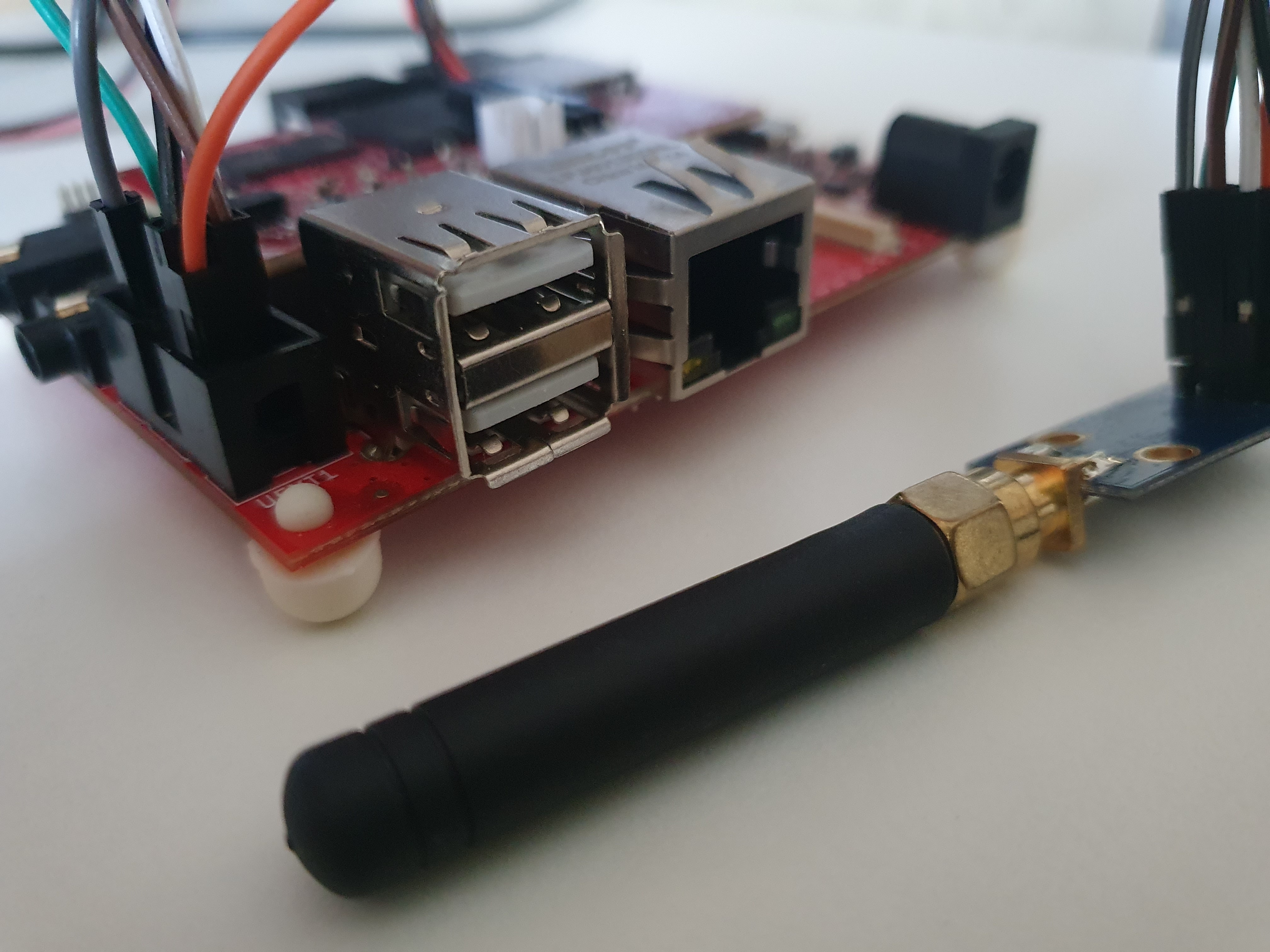
The issue
One day in the lab, the requirement is a rapid prototyping, trasmitting data over the 433Mhz spectrum; nothing more nothing less.
The hardware is choosen with the following strict rule: “it has to be something in some drawer in the lab”.
So, we found ourself working with the E07-M1101D tranceiver module (based on the well known cc1101 ic), and the Olimex STMP157-SOM with its relative evaluation board (based on the STM32MP157).
Once wired up the transceiver to the board and fix the permissions to the /dev/spidev0.0 device, we are ready to attempt our first transmission over the 433 Mhz spectrum.
Without much of a thinking, we end up using a Python package to transmit our first bits.
Full of hopes, we launch the cli command:
printf '\x01\x02\x03' | cc1101-transmit -f 433920000 -r 1000
aaaaand…nothing, we are welcomed with a burp from the Linux kernel in the vest of a Python exception
Traceback (most recent call last):
File "/home/olimex/boh/bin/cc1101-transmit", line 8, in <module>
sys.exit(_transmit())
File "/home/olimex/boh/lib/python3.9/site-packages/cc1101/_cli.py", line 157, in _transmit
with cc1101.CC1101(lock_spi_device=True) as transceiver:
File "/home/olimex/boh/lib/python3.9/site-packages/cc1101/__init__.py", line 563, in __enter__
self._reset()
File "/home/olimex/boh/lib/python3.9/site-packages/cc1101/__init__.py", line 270, in _reset
self._command_strobe(StrobeAddress.SRES)
File "/home/olimex/boh/lib/python3.9/site-packages/cc1101/__init__.py", line 250, in _command_strobe
response = self._spi.xfer([register | self._WRITE_SINGLE_BYTE])
OSError: [Errno 22] Invalid argument
Dear SPI, are you actually working?
Ok, first things first, we are using the stock Olinuxino image and we feel kind of blind about all the peripherals setups. Should we trust the device tree, the kernel config, etc.
We need more proofs.
We want to check that the SPI is working properly before digging deeper in the software.
Luckily, there is a very fast way to proceed.
With the help of the spidev-test utility (a copy extracted from the Linux kernel can be found here), we remove the transceiver, connect the MOSI and MISO pins with a jumper and launch the command
The command output is quite reassuring:
spi mode: 0x4
bits per word: 8
max speed: 500000 Hz (500 KHz)
TX | FF FF FF FF FF FF 40 00 00 00 00 95 FF FF FF FF FF FF FF FF FF FF FF FF FF FF FF FF FF FF F0 0D | ......@....?..................?.
RX | FF FF FF FF FF FF 40 00 00 00 00 95 FF FF FF FF FF FF FF FF FF FF FF FF FF FF FF FF FF FF F0 0D | ......@....?..................?.
TX and RX are equals; we can conclude that the SPI is working properly, so the problem lies somewhere else.
No excuses now, let’s find out.
strace, can you please help me out?
Let’s run the failing command with strace (don’t mind the extra step of the virtual environment activation, it really does not matter):
strace -fv bash -c 'source /home/olimex/boh/bin/activate && printf '\x01\x02\x03' | cc1101-transmit -f 433920000 -r 1000'
Digging the output of strace in the quest of finding EINVAL, we end up with the following lines
[pid 788] read(0, "x01x02x03", 8192) = 9
[pid 788] read(0, "", 8183) = 0
[pid 788] openat(AT_FDCWD, "/dev/spidev0.0", O_RDWR|O_LARGEFILE) = 3
[pid 788] ioctl(3, SPI_IOC_RD_MODE, 0xbeb14dd7) = 0
[pid 788] ioctl(3, SPI_IOC_RD_BITS_PER_WORD, 0xbeb14dd7) = 0
[pid 788] ioctl(3, SPI_IOC_RD_MAX_SPEED_HZ, 0xbeb14de0) = 0
[pid 788] flock(3, LOCK_EX|LOCK_NB) = 0
[pid 788] ioctl(3, SPI_IOC_WR_MAX_SPEED_HZ, 0xbeb15db8) = 0
[pid 788] ioctl(3, SPI_IOC_MESSAGE(32), 0xbeb14b38) = -1 EINVAL (Invalid argument)
[pid 788] close(3) = 0
Well, well, well, pretty easy to see right? Mmm…no, actually no, debugging ioctl messages is really not my free time hobby.
However, we collected a valuable information: at the beginning of our SPI exchange, we passed an invalid argument to the SPI device.
Let’s stress this, the invalid argument refers to the SPI device, not our CC1101 ic!
So, since we are sure that our dear SPI interface is working - remember the test with spidev_test - we are left to check what is actually happening within the invoked code.
Good habit: read the source!
Take another look at the Python trace-back that we posted in the beginning, we see this line:
with cc1101.CC1101(lock_spi_device=True) as transceiver:
which is a Python context manager. It calls the method __enter__ of the class cc1101.CC1101 and assign its result to the variable transceiver. At the end of the with block, it will call the method __exit__.
So, it looks a good place to start looking. If we are lucky, around that line, there could be some hint about our EINVAL.
Aaaaaaaand….here it is, at the specific commit, at time of writing, the method __enter__ is the following
def __enter__(self) -> CC1101:
# https://docs.python.org/3/reference/datamodel.html#object.__enter__
try:
self._spi.open(self._spi_bus, self._spi_chip_select)
except PermissionError as exc:
raise PermissionError(
f"Could not access {self._spi_device_path}"
"\nVerify that the current user has both read and write access."
"\nOn some systems, like Raspberry Pi OS / Raspbian,"
"\n\tsudo usermod -a -G spi $USER"
"\nfollowed by a re-login grants sufficient permissions."
) from exc
if self._lock_spi_device:
# advisory, exclusive, non-blocking
# lock removed in __exit__ by SpiDev.close()
fcntl.flock(self._spi.fileno(), fcntl.LOCK_EX | fcntl.LOCK_NB)
try:
self._spi.max_speed_hz = 55700 # empirical
self._reset()
self._verify_chip()
self._configure_defaults()
marcstate = self.get_main_radio_control_state_machine_state()
if marcstate != MainRadioControlStateMachineState.IDLE:
raise ValueError(f"expected marcstate idle (actual: {marcstate.name})")
except:
self._spi.close()
raise
return self
Right before the call to self.reset(), a very-very-very much appreciated comment state that the max_speed_hz is set to the empirical value of 55700.
Mmm…our spidev_test is using a completely different speed: 500000.
What would happen if we tweak that speed to our “proven” value?
Manually change the code to
self._spi.max_speed_hz = 500000
and run the command again:
printf '\x01\x02\x03' | cc1101-transmit -f 433920000 -r 1000
The output is now
CC1101(marcstate=idle, base_frequency=433.92MHz, symbol_rate=1.00kBaud, modulation_format=ASK_OOK, sync_mode=TRANSMIT_16_MATCH_16_BITS, preamble_length=4B, sync_word=0xd391, packet_length≤255B, output_power=(0xc6,0))
transmitting 0x09783031783032783033 (b'\tx01x02x03')
Eureka! It works!!!
To be fair, the actual proof of the transmission has been done by monitoring the 433.92MHz spectrum with a software defined radio.
Contribute
After all, a contribution was due to the nice Python cc1101 project.
So an issue was opened that lead to this merged pull request.